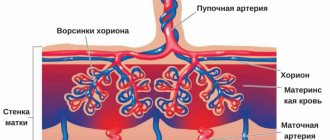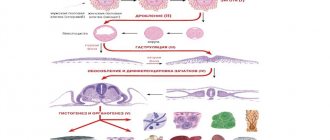As soon as she learns about her pregnancy, a woman needs to immediately begin to treat herself and her own health more carefully, carefully and responsibly. Firstly, from this moment on, the life of the unborn baby depends entirely on the well-being of the mother’s body. Secondly, pregnancy itself causes a temporary decrease in a woman’s immunity. Thirdly, none of us is immune from the development of complications when carrying a child. Fourthly, most of them manifest themselves in the early stages of pregnancy - in the first trimester, which has the highest number of spontaneous abortions during pregnancy.
One of the most dangerous complications during pregnancy can be detachment of the ovum during pregnancy.
Detachment of the ovum: symptoms
Abruption is said to occur when the fertilized egg begins to tear away from the uterus prematurely, which naturally poses a threat to its life. The fetus cannot exist outside the uterus, and therefore complete detachment ends in its death and miscarriage. In fact, detachment is the initial stage of spontaneous abortion.
As the chorion peels off, the vessels that attach it to the uterus rupture, and a bruise occurs in this place - a hematoma. During an ultrasound, the specialist will certainly notice a hematoma forming near the placenta even at the earliest stage. If the detachment is partial and not very pronounced, then perhaps this will be the only sign of a disorder during pregnancy, which was serendipitously discovered during a routine ultrasound examination.
But very often, a woman who begins to experience chorion or fertilized egg rejection is able to notice the symptoms of detachment on her own by changes in her own well-being and in the color of vaginal discharge.
The most characteristic sign of the onset of abruption and the threat of termination of pregnancy is spotting during pregnancy. Traces of brown dried blood indicate that the hematoma formed earlier, and this is the contents coming out of it. It is this kind of discharge that is characteristic of detachment of the fertilized egg. The appearance of ichor from the genital tract indicates the “healing” of the tear, but relapses are not excluded. A change in bloody discharge toward a red color is considered a critical sign of a developing miscarriage and requires immediate hospitalization of the pregnant woman.
Harbingers of a threat can be cramping or nagging pain in the lower abdomen and lumbar region (reminiscent of menstrual pain), as well as a feeling of hardness of the uterus: due to the increased tone, it spasms, rejecting the fetus, which a woman can feel as petrification in the lower abdomen.
Symptoms
Unfortunately, modern medicine cannot foresee such a process in advance. Therefore, all women in labor who are at risk must constantly listen to their own body. The appearance of bloody discharge from the birth canal is the main sign that detachment of the fertilized egg has begun. In some cases, symptoms appear suddenly. A woman may have nagging pain in the lower abdomen, which also indicates the presence of this pathology. On the other hand, such a sign is not always inherent in this particular process. Nagging pain can occur due to congestion in the intestines. Moreover, in medicine there are cases where detachment of the fertilized egg occurred without discharge or sharp pain.
As for the embryo itself, during medical examinations, cardiac dysfunction or hypoxia is detected in the fetus.
Detachment of the ovum: causes
Why the fertilized egg of a normally started and seemingly successfully developing pregnancy suddenly begins to be rejected is not easy to answer. This can be facilitated by a huge number of different factors and reasons, among which experts highlight the following:
- hormonal disorders;
- past abortive cleansings;
- diseases of the maternal reproductive system;
- the presence of tumors of different etiologies;
- inflammatory processes in the pelvic organs;
- physiological pathologies in the development of gynecological organs;
- infectious viral diseases suffered during pregnancy;
- genital infections in a pregnant woman;
- high blood pressure;
- the impact of harmful external factors on the body of the expectant mother (chemicals, gases, etc.);
- bad habits during pregnancy;
- strong physical activity;
- nervous shocks;
- genetic disorders;
- Rh conflict during pregnancy;
- disturbances in the development of the fetus or placenta.
But still, the main reason why detachment occurs during pregnancy, doctors call progesterone deficiency - a condition in which the hormone (progesterone) necessary for the maintenance and development of pregnancy in a woman’s body is produced less than necessary.
Detachment of the ovum: treatment and prognosis
If the symptoms of detachment of the ovum are ignored and no measures are taken to stop it, then with a high probability it will be rejected by the uterus - and a miscarriage or miscarriage will occur. That is why, at the slightest suspicion that something is wrong, a woman should consult a doctor, and if bleeding begins in the early stages of pregnancy, then call an ambulance and go to the hospital without delay!
However, there is no reason for sadness or fear. Obstetricians and gynecologists have extensive experience in the treatment of abruption and, if women seek medical help in a timely manner, they can stop the beginning of abruption in a short time.
If there is a high probability of complete detachment, the woman will be hospitalized. In any case, she is shown absolute rest - bed rest (no sitting, no walking), no sudden movements, no sexual intercourse, and not even a hint of stress! It is useful to lie with your legs elevated above the level of your body. In the early stages, it is also necessary to measure basal temperature to diagnose the condition of pregnancy: a decrease in BT is a bad sign.
To eliminate uterine tone, the pregnant woman will be prescribed antispasmodic drugs (usually No-shpa, Magne B6, Papaverine), for relaxation and calm - sedative therapy (often valerian or motherwort), if necessary, hemostatic drugs (for example, Dicynon) or progesterone therapy will be prescribed (Utrozhestan, Duphaston). If a woman is not yet taking vitamin supplements, the doctor will advise her on folic acid, vitamin E, and multivitamins. This is standard therapy during pregnancy. Among other things, it is necessary to adhere to a gentle diet that prevents stool retention and gas formation.
From now on, after the woman’s condition improves and the woman is discharged from the hospital, her pregnancy requires constant medical supervision and increased attention, at least until the 16th week of pregnancy, but preferably until the very end.
Rest assured: stopping detachment and preventing miscarriage is not that difficult. The main thing is not to ignore the warning signs from your body and the recommendations of doctors, when a violation in the development of pregnancy is obvious - every minute can be precious. And a diligent visit to the antenatal clinic for routine examinations will become your insurance against various kinds of complications: medical experience and laboratory test results will help to identify pathology at the earliest stage of its inception and take the necessary measures to eliminate it.
Health to you and your baby!
Especially for - Margarita SOLOVIOVA
Detachment of the ovum is a threat of termination of pregnancy. At a short stage of pregnancy, there is an opinion that the fertilized egg can break off and attach several times, up to 8 weeks. In general, this can happen throughout the entire period of pregnancy. The uterus is toned, tense, this is accompanied by abdominal pain, bloody or brown discharge. Our body perceives the baby as a foreign body, an invader, and tries to get rid of it. There are various reasons for this, mainly due to a lack of progesterone. Usually they are admitted to the hospital for preservation, injected with drugs that relieve the tone of the uterus, relaxing ones - no-spa, papaverine, ethansylate-hemostatic, and to support the fetus they can inject glucose, drink vitamins, duphaston and rest, lie down, no worries, nervous disorders, valerian control of the lining is also prescribed. But all this needs to be done under the supervision of a doctor!
The most unfavorable is the detachment of the ovum in the placentation zone; with severe detachment, there may be a malnutrition of the fetus, the threat of termination of pregnancy at any stage, therefore the pregnant woman needs regular observation by a doctor, periodic ultrasound, metabolic therapy, Doppler measurements at 28 weeks, CTG at 33 weeks.
In medicine, there are many positive outcomes of pregnancies when detachment of the fertilized egg occurred in the early stages. If you want to continue your pregnancy, then you need to follow all the doctor’s instructions and prescriptions, remain calm and refuse sexual activity. It is best to undergo observation in a hospital.
If there is a threat of miscarriage, bed rest allows you to avoid mechanical effects on the fertilized egg or the fetus. The fact is that when walking, and even more so when running, and even when performing seemingly simple household chores, the muscles of the anterior abdominal wall tense, intra-abdominal pressure constantly changes, which helps to increase the tone of the uterine muscles. In turn, this can lead to detachment of the ovum and the onset of labor. When the expectant mother lies in bed, the muscles of the anterior abdominal wall are relaxed, which also helps to relax the muscles of the uterus, and the fertilized egg is not affected by the vibration that occurs when performing any work.
Bed rest also protects against bleeding in case of placenta previa, because in this condition, the placenta blocks the exit from the uterus, it is not tightly attached to the wall of the uterus, but lies above the internal opening of the cervical canal. Even with little physical activity, the placenta can detach from the walls of the uterus, which can lead to bleeding, which will lead to a deterioration in the condition of mother and baby.
Women who have given birth probably know that pregnancy in the early stages is most associated with various risks. Gynecological practice shows that most miscarriages occur in the first trimester.
It is for this reason that expectant mothers need to be very careful about their health, avoiding various risks. In this article we will reveal the answers to such important questions:
- For what reasons does pregnancy termination occur?
- Miscarriage in the early stages of pregnancy - how does it happen?
Treatment of retrochorial hematoma
If you suspect a retrochorial hematoma, you should contact an obstetrician-gynecologist. The specialist will tell you how to treat fetal sac hematoma in each individual case. Therapeutic measures are carried out throughout the entire period of threatened miscarriage (about 4 weeks), and then repeated at the most dangerous periods (12 - 14, 20 - 24, 28 - 32, 36 - 38 weeks).
Expectant mothers with gravid hematoma should know how detachment of the ovum heals. To do this, you need to follow the following recommendations:
• Maintain bed rest with your legs elevated. This measure will allow you to relax the smooth muscles of the uterus, as well as stop signs of a threat of spontaneous abortion. In this position, blood circulation is normalized and the hematoma is emptied if it is located in the fundus of the uterus.
• The patient is prohibited from having sex, lifting weights, or performing heavy physical work.
• It is important to adjust your diet to avoid flatulence, constipation and increased intestinal motility. To do this, the patient should give up legumes, cabbage, chocolate, coffee, and foods rich in coarse dietary fiber.
• To restore the psycho-emotional state, drugs with a sedative effect are used: tincture of motherwort, valerian, peony, Novopassit, etc.
• To relieve pain and eliminate spasms, antispasmodics are used, for example, Papaverine, No-shpa, Magne-B6.
• In case of hematoma in the early stages, hormonal drugs are prescribed: Utrozhestan, Duphaston, etc.
• Vitamins and minerals will help improve uteroplacental blood flow. For this purpose, vitamin E, folic acid, Curantil, Actovegin are used.
• Hemostatic drugs will help stop bleeding. For this purpose, Dicinon, Ascorutin, Vikasol, Transekam are prescribed for abruption of the ovum.
The decision to prescribe any medications and draw up a treatment regimen is made by the attending physician. If the expectant mother started treatment on time and followed the doctor’s recommendations, then the pathology will disappear without a trace within 2 to 5 weeks.
Reasons why the fertilized egg exfoliates
Even completely healthy and strong women, unfortunately, cannot be immune from such an unpleasant process. Miscarriage in the early stages of pregnancy occurs due to detachment of the fertilized egg. This process is the first stage of spontaneous abortion.
Important!
When the fertilized egg is rejected from the chorion, a small wound is formed as a result of damage to the blood vessels. Blood begins to accumulate behind the membrane, resulting in the formation of a hematoma. Doctors call it retrochorial.
The resulting hematoma tends to increase in size. And this further provokes detachment of the fertilized egg. As a result, if no measures are taken, the fertilized egg is completely rejected (pregnancy is interrupted).
However, timely medical intervention usually helps stop this negative process. It is difficult to say for what exact reason the fetus is rejected. But there are common ones that ensure an incipient miscarriage. Among them:
- Recent illnesses of viral or infectious origin;
- Pathologies of the structure and development of the uterus;
- Excessive and frequent physical activity;
- Frequent emotional stress and stress;
- Hormonal disorders, in most cases - a lack of progesterone in a woman’s body;
- The presence of tumors, gynecological diseases;
- Negative environmental, industrial and household factors;
- Alcohol abuse;
- Presence of abortions;
- Rhesus conflict pregnancy.
Unfortunately, it is impossible to predict the occurrence of this phenomenon. This can happen to any pregnant woman. For this reason, in the early stages of pregnancy, you should carefully consider the state of your body and respond to the most minor changes in it.
In most cases, potential fetal rejection is indicated by pain in the lower abdomen. By their nature, they are pulling, reminiscent of the pain that occurs during menstruation.
Pain may be accompanied by pain that radiates to the lower back. A woman who exhibits such symptoms should immediately go to the hospital. Traces on underwear due to placental abruption may be yellowish or brown. In some cases, a brown color indicates that the hematoma is resolving, but a re-tear may occur.
Attention!
Detachment of the ovum is diagnosed using ultrasound.
If the opinion is that this process is natural selection. And if the fetus is strong and healthy, then it will survive without medical care. It also happens that detachment will occur several times during the development process. But in the end result, the fertilized egg, which is healthy, is fixed very firmly in the uterus and develops safely. Yes, not all pregnant women undergo preservation when symptoms of abruption appear.
Important!
Gynecologists warn that the risk of miscarriage without treatment is very, very high.
Possible symptoms of peeling
Unfortunately, it is impossible to know in advance whether this will happen to you or not. This situation can arise under any conditions. That is why you need to be attentive to your body in order to detect a problem in time.
Most often, a woman may experience pain in the lower abdomen. In this case, the pain can be called nagging, the sensations are the same as during menstruation. There may be some discharge (slightly bloody). If you discover such a symptom, you should immediately go to the doctor. When the egg begins to peel off, you may notice yellow or brown marks on the laundry. Sometimes dark-colored discharge indicates that the hematoma is resolving, however, the tearing process may repeat. In some cases, detachment may occur without discharge.
We also recommend reading: Pain in the vagina during pregnancy
In order to detect the problem, the doctor will need to use ultrasound. Some believe that egg detachment is a completely natural phenomenon. With a healthy and strong fetus, there is a high probability that it will survive and develop further. There are times when the process is repeated several times. However, this does not affect the fetus if it is strong and healthy. Not all women who had symptoms of egg detachment went to the hospital and were under strict medical supervision. But if you want to give birth to your child, you should never neglect medical examination and treatment, as this may negatively affect your pregnancy.
Options for detachment of the ovum in the early stages of pregnancy
The membranes can peel off in different ways. There are several situations that provoke spontaneous abortion.
Biochemical pregnancy. This is the name for a pregnancy that was interrupted even before the missed period (1-2 weeks). In this case, the fertilized egg cannot be determined by ultrasound, and only a blood test for hCG can indicate conception. Often women do not even realize that they are pregnant.
What happens when the fertilized egg exfoliates at about 2 weeks? Bloody discharge appears from the genital tract, which women mistake for the onset of menstruation. At this time, the cause of miscarriage is a defect in the fertilized egg, which occurs during the formation of the embryo. The cause may also be hormonal imbalances in a woman.
How to treat pathology?
If there is a suspicion that the fertilized egg is still exfoliating, then the pregnant woman is admitted to the hospital for preservation. Inpatient detachment is treated under the supervision of a doctor, although the woman has the right to refuse hospitalization.
Important!
In the initial stages of detachment, the most important thing is complete rest for the woman. It is forbidden to perform difficult work; it is recommended to be constantly in the healing position.
The abdominal wall should be in a state of complete rest, and this can only be in a supine position. When performing any action, the abdominal wall tenses, and when a woman walks, this creates vibration, which provokes an increase in intra-abdominal pressure. This tones the uterus and the detachment will only speed up. In addition, the doctor may advise the woman to place a cushion or pillow under the buttocks to ensure blood flow from the pelvic area.
During this period, very active intestinal peristalsis is also dangerous, which is why the pregnant woman is prescribed a gentle diet with the exclusion from the diet of foods that provoke gas formation, weaken or strengthen. In addition, you should avoid drinking tea and coffee.
During this period, you should definitely abstain from sexual intercourse - any sex is strictly prohibited if there is a threat of pregnancy. The emotional state of the expectant mother is also of great importance. Complete peace should be ensured and any worries and stress should be eliminated from a woman’s life.
Treatment
If a threat of miscarriage has been detected, then the expectant mother must be admitted to the clinic for safekeeping. You have every right to sign a waiver, but it is better to undergo full treatment under the precise supervision of a doctor to avoid consequences.
You need to understand that if a problem is detected, you must constantly be at rest, avoid any stress (stressful or physical), and maintain bed rest.
Your tummy should be in a calm state. This means that the slightest movement creates internal vibrations, which leads to increased intra-abdominal pressure. That's why it's so important to lie down all the time. Walking causes your abdomen to tense up, which can negatively affect the development of the detachment. Doctors may advise you to place a soft pillow under the buttocks to ensure blood flow.
In this case, the expectant mother may be prescribed a special diet that includes light foods. This will help avoid gas formation. You should give up tea or coffee, giving preference to other healthy drinks. At this time, intestinal peristalsis will not benefit you.
We also recommend reading: Gums Bleed During Pregnancy
In order to protect your health and the condition of the fetus, it is better to avoid sexual relations if a risk of miscarriage has been detected. The mother’s positive attitude and the presence of a joyful atmosphere play a big role. There should be no stress, anxiety, or worry.
Drug treatment
Many pregnant women do not want to take pills again, but in this case there is no way to do without them. These medications will not harm you, but on the contrary, will help save the child.
The doctor may prescribe the following medications:
- medications that can stop bleeding;
- hormonal drugs;
- vitamins;
- medications to stop abdominal pain.
You can read reviews about such drugs on the Internet or contact your doctor. Each case is individual, so you should listen to your doctor and follow all his instructions.
How long will it take to be treated?
It is difficult to answer this question, since every situation is different, and everyone's treatment is different. However, it is safe to say that the responsibility of the pregnant woman and strict adherence to all medical recommendations play an important role. It usually takes two weeks or more to stop the detachment of the fertilized egg. Therefore, if you want to get better quickly, take everything seriously.
After recovery, you will need to be under medical supervision until you give birth to your healthy baby. Taking this into account, it is imperative to attend all scheduled examinations and examinations, without missing a single visit to the doctor. Gynecologists say that the risk of repeated detachment of the ovum will be present until the formation of the placenta is completely completed.
So, we figured out what abruption of the ovum is, why it happens and what it is like. We learned in what cases it is possible to save a pregnancy and give birth to a healthy child. If you take your health responsibly, there is a great chance of recovery. Be attentive to yourself and do not forget that the baby’s life directly depends on you.
Medicines
Unfortunately, this situation cannot be avoided without medications, but doctors say that they help maintain pregnancy. A pregnant woman may be prescribed:
- antispasmodics (Magne B6, Papaverine, No-shpa);
- drugs that stop bleeding (Etamzilat);
- vitamins (vitamin E and folic acid);
- sedatives;
- hormonal agents (Utrozhestan, Duphaston) and others.
The attending doctor selects the drugs needed for treatment in each individual case.
Therapy and medical supervision
The duration of therapy will vary in each individual case, but will be at least 2 weeks. Treatment largely depends on how well the woman adheres to all medical prescriptions. Therefore, if you want a quick improvement in your condition, you need to strictly follow them.
In the future, a woman who has had a detachment of the ovum must undergo strict medical supervision until the end of pregnancy. Do not neglect routine examinations and examinations. Doctors say that the high risk of relapse will remain until the placenta is finally formed.
For most women, pregnancy is a joyful and important event. The first trimester is the time when the fetus is just beginning to form and has not yet fully settled inside the uterus. During this period, you need to carefully monitor your health and the course of pregnancy in order to detect possible pathologies in time. One of the complications that can lead to miscarriage is detachment of the fertilized egg.
Detachment in the early stages. Causes
It is difficult to accurately determine the causes of detachment of the ovum. All the main factors are given below:
- little progesterone;
- emotional overload, endless worries, stress;
- physical labor, sports activities;
- abnormal structure of the uterus;
- diseases in the gynecological area;
- oncology;
- viral, infectious diseases;
- Rh conflict between fetus and mother;
- alcoholism;
- developmental defects;
- abortions performed;
- domestic unsettlement;
- bad ecology.
Process description
Detachment of the ovum is the beginning of spontaneous abortion (miscarriage). The egg begins to separate from the placenta, thereby damaging the blood vessels. A hematoma forms at the site of the rupture. It begins to enlarge, causing further detachment.
Detachment of more than 40% of the size of the fertilized egg is considered dangerous. In this case, the diagnosis is “threat of miscarriage”. In this case, treatment is necessary, otherwise the fetus will completely detach from the placenta, which will lead to miscarriage or fading of the pregnancy.
Detachment of less than 40% in medical practice is called partial detachment of the ovum. With a slight detachment, the resulting hematoma can heal itself, and the fertilized egg will again attach to the placenta. And yet, if a pathology is detected, it cannot be ignored, since when the fetus is separated from the chorion, it will receive less nutrients. Placental insufficiency may develop.
When this happens in the early stages of pregnancy, the situation may repeat one or more times in a later period. In some cases, by 12 weeks of pregnancy, the fertilized egg is already firmly attached to the chorion, and then relapses no longer occur.
This pathology can only be diagnosed using an ultrasound, which will show the damage. Based on the size of the hematoma, it is possible to determine the degree of risk for the woman and child and prescribe appropriate treatment in a hospital.
Prevention
To prevent detachment of the ovum in the first weeks of pregnancy, you need to carefully approach the issue of planning conception. This is a responsible step and before deciding on it, you should visit specialists and check your health for possible pathologies. It is diseases that are not identified and not treated in time that can cause spontaneous abortion in the early stages.
It is important to take care of your own health during pregnancy, avoid physical and psycho-emotional stress, as well as taking medications and alcoholic beverages. It has been proven that stress factors are very dangerous for the unborn baby.
Doctors admit that in the modern world the threat of miscarriage is by no means uncommon. This is due to the deterioration of environmental living conditions, disruption of the rhythm of life, and the increasing frequency of chronic diseases. Fortunately, medicine has been able to make significant progress in the diagnosis and treatment of abruption of the ovum, which allows more pregnancies to be maintained.
Author: Olga Rogozhkina, doctor,
Symptoms
There are few signs for determining detachment of the ovum, but they are pronounced. If you have any of them, you should definitely contact an ambulance without waiting for a scheduled appointment with a doctor.
Reasons to suspect an incipient miscarriage are:
- Spasmodic pain in the lower abdomen, radiating to the lumbar region. The sensation is usually similar to period pain. Spasms occur due to contraction of the uterus, which tries to push out the exfoliated fetus.
- Bleeding. There can be three types: Brown. Most often this is a sign that the existing hematoma is healing.
- Sukrovichnye. They talk about the growth of a hematoma.
- Bright red. They require immediate hospitalization, as this is a clear sign of an incipient miscarriage.
If you suspect detachment of the ovum, you must immediately contact a medical facility. Miscarriage can be prevented if treatment is started on time.
The above signs and symptoms may also indicate other pathologies of pregnancy. There is no need to self-diagnose. The correct diagnosis can only be made by a doctor based on the results of ultrasound and, if necessary, other studies.
Degree of detachment
The degree of detachment is the determining point for subsequent actions. If the hematoma of the detachment of the ovum is more than 40%, it is difficult to normalize the situation. In total, there are several stages of detachment:
- threatened miscarriage (detachment at the initial stage, pregnancy can be maintained if doctors’ instructions are followed);
- an incipient miscarriage (abdominal pain, discharge, pregnancy is difficult to maintain);
- abortion in progress (pain increases, discharge intensifies, fetus dies);
- incomplete abortion (part of the egg comes out, the other part is removed promptly);
- cervical pregnancy (when the egg is attached to the cervix, the only way out is surgery);
- septic abortion (complicated option, poses a threat to the life of the mother);
- late abortion (when the term is more than 13 weeks).
To determine the extent of the damage, an ultrasound scan of the amniotic sac is performed and, based on the data obtained, further tactics are chosen.
Causes
It is impossible to say for sure what causes detachment. Factors may vary, and it is not always possible to determine what was at fault in a particular case. Sometimes a woman herself provokes pathology by not following the necessary rules during pregnancy. Or the detachment occurs for reasons beyond its control.
Circumstances that increase the risk of a threat:
- conflict of Rhesus of mother and child;
- genetic disorders;
- lack of progesterone, less often other hormonal imbalances;
- physical exercise;
- stressful situations;
- frequent abortions before the current pregnancy;
- bad habits;
- high blood pressure;
- infectious diseases of the genitourinary system.
During pregnancy, you should, if possible, try to eliminate these factors and keep your health under control by constantly seeing a doctor.








